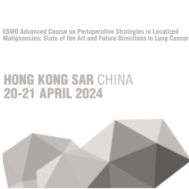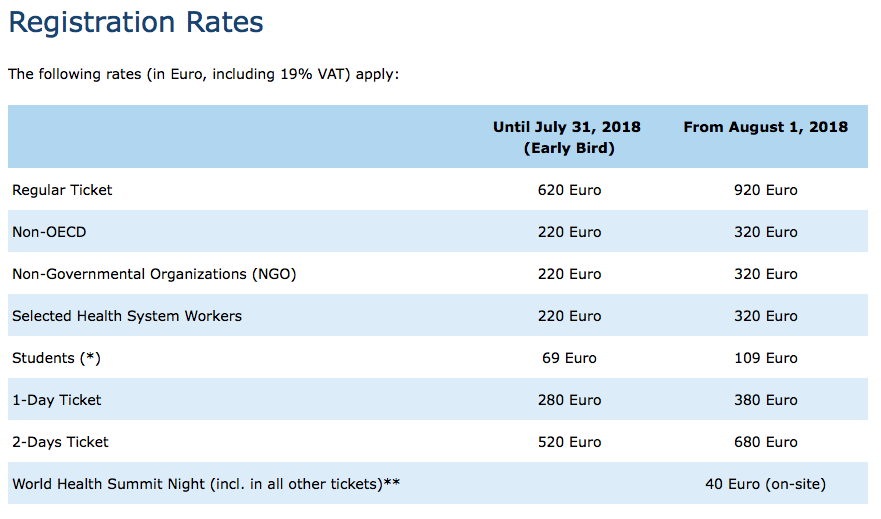World Health Summit 2018

Start
Sun, 14 Oct 2018, 07:00
End
Tue, 16 Oct 2018, 06:00
WebSite
Hashtag:
#WHS2018
Venue:
Exhibit
Symposia
Workshops
Organiser
Sponsor
The World Health Summit is the annual conference of the M8 Alliance of Academic Health Centers, Universities and National Academies. Through the InterAcademy Partnership (IAP) for Health, it is organized in collaboration with all National Academies of Medicine and Science.
The World Health Summit aims to improve health all over the planet, catalyzing that process through collaboration and open dialogue, and steering tomorrow’s agenda to improve research, education, healthcare, and policy outcomes.
It brings together researchers, physicians, key government officials, and representatives from industry as well as from NGOs and healthcare systems all over the world to address the most pressing issues facing every facet of healthcare and medicine in the upcoming decade and beyond.
The World Health Summit is built on the stable foundation of academic excellence provided by the M8 Alliance and has strong political support from a variety of partners at global, national and state levels.
Participants
The World Health Summit brings together about 2,000 decision-makers and representatives from the entire spectrum of health-related fields and industries. Arriving from more than 80 countries, its participants address the most pressing issues that medicine and healthcare systems will face in the upcoming decade and beyond.
Who attends the WHS?
- Top-level researchers and members of the scientific community
- High-profile political decision-makers
- Executives and representatives from healthcare systems
- Leaders in health-related industries and the technology sector
- Representatives from foundations and civil society
- Students and young professionals from a wide range of health-related fields
Programme available online here
Central topics 2018 include:
Pandemic Preparedness
The ability to prevent, detect, respond to and control outbreaks is a significant investment that many countries are still struggling to make. New financing mechanisms – such as the Pandemic Emergency Financing Facility and WHO’s Contingency Fund – are therefore critical to ensuring global health security and saving lives. In this process, domestic financing for preparedness and reliable public health mechanisms poses a key challenge.
The Sustainable Development Goals: Health in All Policies
The SDGs are an indivisible and interdependent set of goals for sustainable development that are inherently linked with the Health in All Policies approach. It provides a tool for finding common ground between economic and social development, environmental sustainability and human health. One of the most important challenges for global health in the coming decade will be to develop synergies between a wide range of SDGs and health.
Access to Essential Medicines
Some countries have made substantial progress towards improving access to essential medicines and treatments for fighting HIV/AIDS, malaria and tuberculosis. Even so, access to essential medicines in many parts of the developing world remains inadequate, and new challenges – like access to NCD medicines – have arisen. Recent progress shows that access to essential medicines can be improved through stronger partnerships between governments, pharmaceutical companies, civil society and individual consumers.
Health Systems Strengthening
Although we now have a sophisticated arsenal of interventions and technologies for curing disease and prolonging life, gaps in health outcomes continue to widen. The power of existing interventions is not matched by the capacity of health systems to deliver them to those in greatest need, in a comprehensive way and on an adequate scale. Smart investments have to be the centerpiece of domestic policies and financing.
Antimicrobial Resistance
Antimicrobial resistance is rising to dangerously high levels all over the world, and now threatens our ability to treat common infectious diseases. The global crisis reflects the overuse of common antibiotics, as well as a lack of new compound development on the part of pharmaceutical companies to address the challenge. Fresh efforts have been made recently to coordinate efforts, implement new policies and renew research efforts. But major gaps remain.
The Digital Healthcare Revolution
The global population is growing and ageing, and that is having a profound impact on healthcare all over the planet. Meanwhile, new developments in technology are blurring the boundaries between the physical, biological and digital worlds. The goal is now the personalization of medicine – allowing tailored treatments for individual patients based on their unique genetic makeup. This revolution has the potential to provide huge health benefits and empower patients, but it also poses new ethical challenges, and could make inequities in healthcare even starker than they are today.
More events

Sat, 20 Apr 2024 - Sun, 21 Apr 2024

Mon, 22 Apr 2024 - Wed, 24 Apr 2024

Mon, 22 Apr 2024 - Tue, 23 Apr 2024

Tue, 23 Apr 2024 - Thu, 25 Apr 2024

Tue, 23 Apr 2024 - Thu, 25 Apr 2024

Wed, 24 Apr 2024 - Fri, 26 Apr 2024

Thu, 25 Apr 2024 - Sat, 27 Apr 2024

Fri, 26 Apr 2024 - Sat, 27 Apr 2024


Wed, 1 May 2024 - Fri, 3 May 2024



















